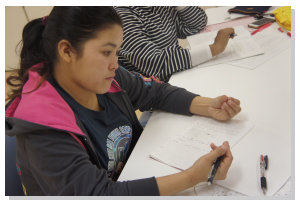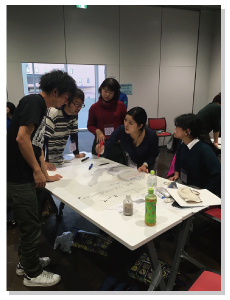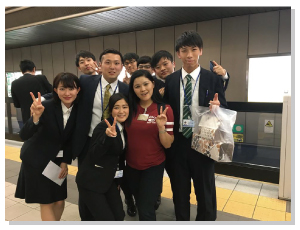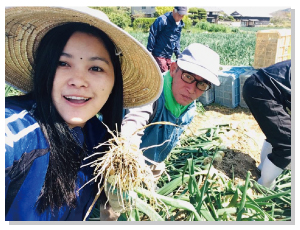Final Report
Sunita's Final Report
The turning point of my life
The reason I applied for the Duskin leadership training
I applied for this training program as I wanted to learn the following.
- How to run associations for the deaf in unurbanized areas
- How to develop young deaf leaders
- How to eradicate discrimination between deaf and hearing people
I learned many things in Japan. Being selected as one of the 20th Duskin leadership program trainees was a turning point of my life.

Things in Japan that surprised me
I was really surprised to be told that you have to strip naked when you take a dip in an onsen (a hot spring). In Nepal, you always have to put on a piece of clothing when you take a bath. You never take a bath with many strangers either. When I was told that people in Japan have a bath naked with total strangers I thought I could never do it, but I got used to it before long. When I visited Hyogo Association of the Deaf, I watched a court trial of a forced sterilization of a couple. The accusers were an elderly deaf couple. Apparently they were not allowed to have children and were subjected to forced sterilization. I felt immensely sad as I sat through the trial. I am deaf just like them, so I totally understood their feelings. This experience stayed in my mind as a sad incident.
Group training
All of us trainees attended a training program, consisting of three sessions, designed to understand each other’s disability and their respective needs. We learned about the lifestyle of wheelchair users and persons with visual impairment, the difficulties they face, and what kind of support is available for them. In Nepal I had contact only with deaf people. I learned many new things by meeting the five trainees in Japan with various disabilities.
Dream Map was an activity to visualize our dream for the future. The Duskin leadership training includes not only sit-in lectures but these workshops where participants take an active role. Writing down what I see myself doing three, and five years later gave me a clear vision of what I would like to learn in Japan, and the first step to take when I am back in Nepal. It was a truly enjoyable program.
Individual training programs
1.NPO Japanese ASL Signers Society
I had two weeks of presentation training at NPO Japanese ASL Signers Society. I had spoken in front of an audience in Nepal, but I did not really know how to present myself. It was great to learn the proper way of giving a presentation because when I go back to Nepal, I will have to share my learnings from Japan with many people. I learned that a successful presentation relied on keeping the presentation within time limit, doing enough preparation, and practicing over and over.
2.Hyogo Association of the Deaf
I stayed in Hyogo Prefecture for about one month and attended many training programs. Two of the programs have a special place in my mind. One was Studio Tatsunoko. It was a welfare studio where retired deaf people, or deaf people with multiple disabilities engaged in light , paid duties. The studio let me work with them. It was a great place, as a place for deaf people to be together, and as a place for work. The other place was Awaji Fukuro No Sato, a center for elderly deaf people, where I spent three days. I was allowed to be part of the team to support the elderly deaf people. In Nepal, there are also many elderly deaf people, but they do did not go to school, have no education and cannot communicate in sign language. They have no way of communicating their thoughts or feelings. If a center like Awaji Fukuro No Sato can be established in Nepal, it will serve as a place to hear the voice of elderly deaf people, a place to help them live a happy life.
3.The 52nd National Debate Meeting of Deaf Youth
I went to the debate meeting in Akita with Yuki, another trainee. Many young deaf people from all corners of Japan were there, discussing various subjects. There were also study meetings, as well as opportunities to present outcomes of the discussions. I was touched to see such wonderful activities by young deaf people.


Amazing things I saw in Japan
Myo Min, a trainee like myself, and I often visited places together. At train stations, we realized that the ticket gate had extra space to let through wheelchair users. The stations also had Braille blocks. In Nepal, public transport is not barrier-free, meaning it is impossible for people with disabilities to go outdoors. In Japan, station officers would help you, you can go anywhere you like. I wanted transport in Nepal to be also free of barriers, if only little by little. To do that, we will need to join hands not just with deaf people, but with other disability organizations, and negotiate with the government. The other thing that was wonderful about Japan was its organized welfare system that helped elderly deaf people live in peace. During my training program in Hyogo, I visited the home of an elderly deaf couple. Their lifestyle seemed peaceful and joyful. I would like to make Nepal a country where elderly deaf people can live in peace just like in Japan.

What I would like to do when I go back to Nepal
First I will share what I learned in Japan with others. I was born in a region called Syangja. I would like to strengthen and expand the association for the deaf in Syangja stronger. I would also like to launch divisions for young deaf people and deaf women for various activities. Especially in Nepal, career advancement of women is still a rarity, and many women hardly ever leave home. I would like to approach women who are not fully living their potential and launch a women’s division. Third, I would like to engage in activities with Duskin leadership training graduates as there are many of them in Nepal. One of them is Keshav, one of the 18th Duskin leadership program trainees. I had a chance to talk to him a bit before coming to Japan and we have been saying to each other, let’s do our best to make Nepal a better place. I would like to stay connected with the Duskin graduates and drive our activities in Nepal.
Finally, I would like to create a center for elderly deaf people. This is the thing I would like to do most. There are many elderly deaf people in Nepal, who never went to school, so they are unable to talk to others in sign language and living their life in void with nothing to do. I would like to create a place for them to be together, somewhere for them to belong. I will do my best to realize these dreams.
Words of appreciation
This training program really became a turning point for me. I would like to express my gratitude to the committees of JSRPD and Duskin AINOWA Foundation for having given me this wonderful opportunity. Thank you to the Duskin family and all Japanese people for arranging such a long and successful training in Japan. Thank you very much to my Japanese friends and organizations who provided kind support and help. Time has flown so rapidly, and 10 months passed in the blink of an eye. The most important thing I learned is that we all have the same human heart. That, no matter who we are, where we are from, what our disability is, or our skin color or gender identity, we do our best because we are the Duskin family.




